|
|
Wedding Photography
|
The groom usually wears the Barong Tagalog during the wedding, along with the male attendants, though nowadays the wealthy opt to don Western attire such as a tuxedo. Weddings held within the same year by two siblings, usually sisters, called Sukob are frowned upon as it is regarded as bad luck. Some hold it that the wedding rings dropping to the ground is a portent of bad luck (this is usually said to the ring bearer to ensure that the child is careful in handling the rings). Money, in the form of paper bills, is sometimes taped or pinned to the groom and bride's dress during their first dance.
Indian wedding customs
Indian weddings take anywhere from five minutes to several days, depending on region, religion, and a variety of other factors. Due to the diversity of Indian culture, the wedding style, ceremony and rituals may vary greatly amongst various states, regions, religions and castes. While the Christians of India usually follow a more or less Western wedding ceremony, the Indian Hindus, Muslims, Jains and Sikhs follow traditions quite different from the West. In certain regions, it is quite common that during the traditional wedding days, there would be a tilak ceremony (where the groom is anointed on his forehead), a ceremony for adorning the bride's hand and feet with henna (called mehendi) accompanied by Ladies' Sangeet (music and dance), and many other pre-wedding ceremonies. Another important ceremony followed in certain areas is the "Haldi" program where the bride and the groom are anointed with turmeric paste. All of the close relatives make sure that they have anointed the couple with turmeric. In certain regions, on the day of the wedding proper, the Bridegroom, his friends and relatives come singing and dancing to the wedding site in a procession called baraat, and then the religious rituals take place to solemnize the wedding, according to the religion of the couple. While the groom may wear traditional Sherwani or dhoti or Western suit, or some other local costume, his face, in certain regions, is usually veiled with a mini-curtain of flowers called sehra. In certain regions, the bride (Hindu or Muslim) always wears red clothes, never white because white symbolizes widowhood in Indian culture. In Southern and Eastern states the bride usually wears a red Sari, but in northern and central states the preferred garment is a decorated skirt-blouse and veil called lehenga. After the solemnization of marriage, the bride departs with her husband. This is a very sad event for the bride's relatives because traditionally she is supposed to permanently "break-off" her relations with her blood relatives to join her husband's family. Among Christians in the state of Kerala, the bridegroom departs with the bride's family. The wedding may be followed by a "reception" by the groom's parents at the groom's place. While gifts and money to the couple are commonly given, the traditional dowry from the bride's parents to the couple is now officially forbidden by law.
|
|









